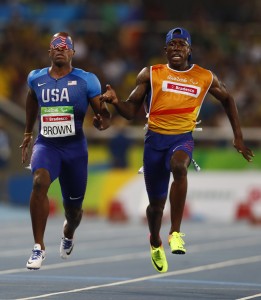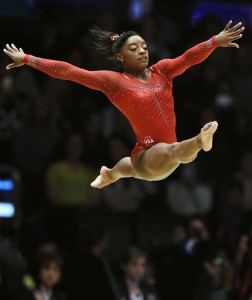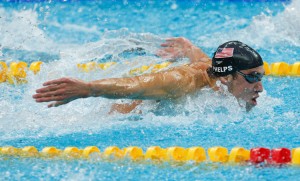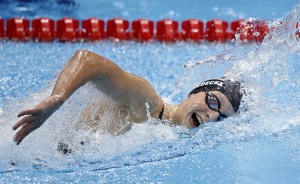Rio’s Paralympic Games
Tuesday, September 13th, 2016September 13, 2016
Beginning last week, on September 7, the Summer Paralympic Games took center stage in Rio de Janeiro, Brazil, just a couple weeks after the close of the Olympic Games. The Paralympic Games are a multisport international competition for athletes who have physical or mental disabilities. Like the Olympic Games, the Paralympics are divided into Summer Games and Winter Games. Since 1988, the Paralympics have been held after the Olympic Games and at the same site as the Olympics. The Paralympic Games are a separate competition from the Special Olympics, which are restricted to athletes with intellectual disabilities. The Summer Paralympic Games attract about 4,000 athletes from some 150 countries.

U.S. sprinter David Brown, left, runs with his guide, Jerome Avery, in the 100-meter T11 race at the Paralympic Games in Rio de Janero, Brazil, on Sept. 11, 2016. Credit: © Jason Cairnduff, Reuters
Team USA track and field stars won big over the past weekend. Sprinter David Brown (with guide Jerome Avery) won his first gold medal in the 100-meter T11 race. (T11 athletes are nearly or totally blind.) Tatyana McFadden won her second-consecutive Paralympic gold in the women’s 400-meter T54 race, and Gianfranco Iannotta topped the men’s 100-meter T52. (T54 and T52 athletes are confined to wheelchairs.) Deja Young won gold in the women’s 100-meter T47 race. (T47 athletes have upper limb impairment.) In the women’s triathlon, Team USA’s Grace Norman claimed PT4 gold and Allysa Seely, Hailey Danisewicz, and Melissa Stockwell won gold, silver, and bronze respectively in the PT2 competition. (PT2 and PT4 athletes have different mobility impairments.) Team USA swimmers Elizabeth Marks, Roy Perkins, Becca Meyers, and Brad Snyder won gold in their respective events. As of today (the games continue through Sunday), Team USA Paralympians have won 46 medals, including 16 golds. China has the most medals (118), and the United Kingdom (63) and Ukraine (61) have the second- and third-most medals.
Participation in the Paralympic Games is organized into five major disability categories: athletes who are amputees; athletes with brain damage; athletes with significant intellectual disability; athletes confined to wheelchairs; and athletes with visual impairment. Other athletes have such physical conditions as dwarfism, multiple sclerosis, or deformities of the limbs. The summer games consist of 20 different sports, including the unique sports of boccia (a lawn bowling sport), goalball (a blind team sport), and wheelchair dance. The Paralympic Games began in 1948 with a sports competition that involved veterans of World War II (1939-1945) who had spinal injuries.





